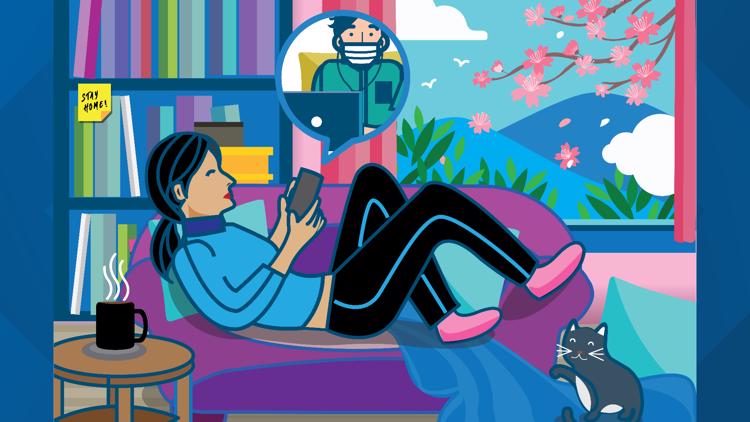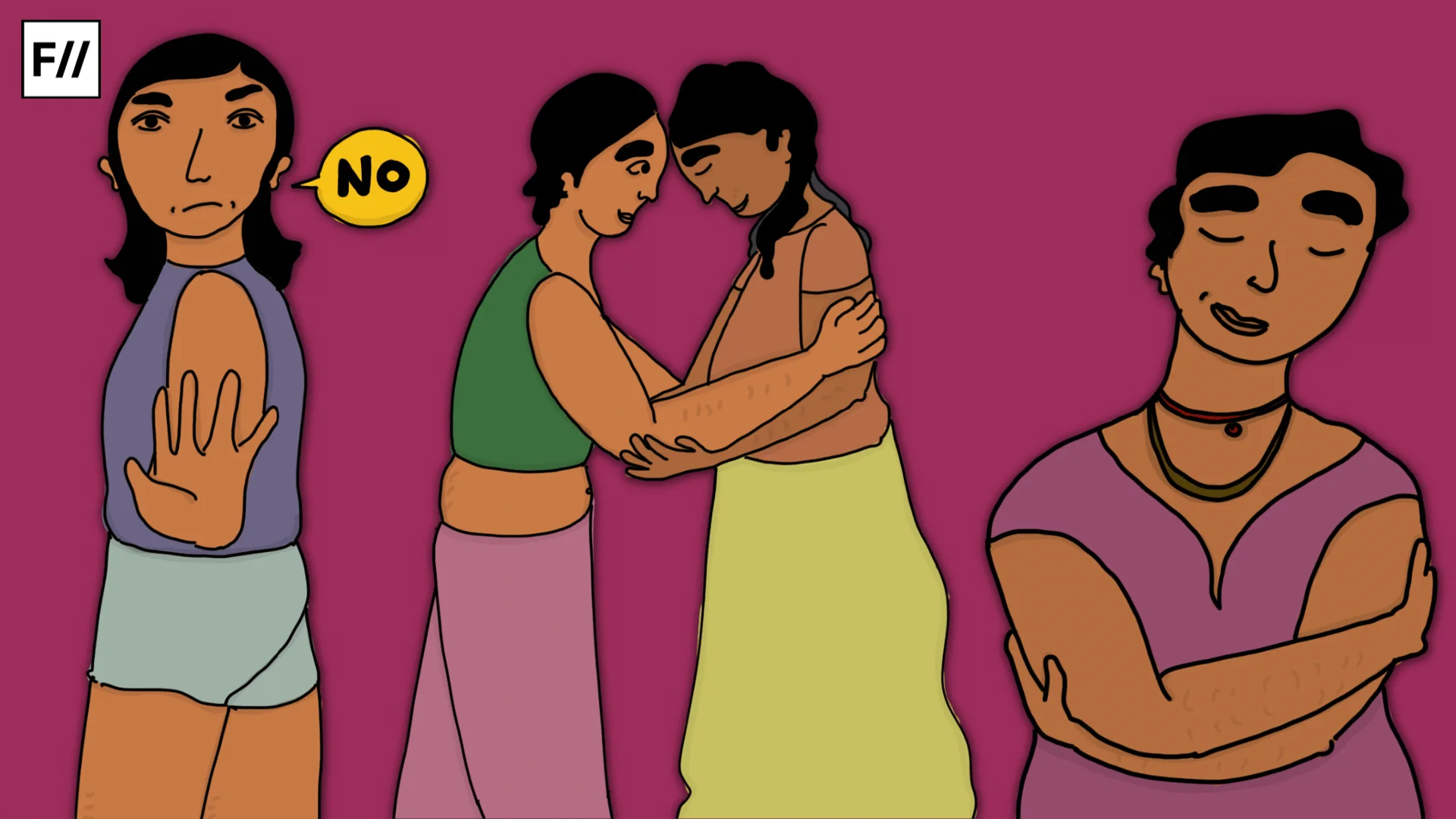Over the past month, the components of our lives that exist outside the four walls of our households have found their way inside, with the help of technological advancement. Applications like Zoom, Skype, WhatsApp etc. have made it so and hence, physical distancing does not necessarily mean complete and utter isolation.
But, what do we do when we want to have sex?
You could masturbate. What better way to explore yourself and soothe yourself at the same time right?
However, if you want to explore that sexual intimacy with a long distance partner, or someone you’ve recently started dating, or a friend with benefits, sexting is probably a good way to go.
A sext is typically consists of an exchange of sexually explicit text messages, videos or photographs. With the advent of dating platforms like Tinder and Bumble, messaging services that allow us to send and receive images, seems to be a growing online platform for sexual expression.
But What Stops Us From Sexting?
I don’t know about you, but the thought of sexting usually comes with a bout of anxiety, especially with the prospect being found out or having my nudes leaked on the internet and being shamed for it – and a myriad number of other fears inducing scenarios play out in my head. It’s funny how much the fear of shame and other repercussions can prevent us from something we would have otherwise loved doing.
Despite the lengthy fight for sexual liberation, women continue to be shamed for voicing their enthusiasm towards sex. The phrase sleeping around comes with negative connotations when used in regard with women. Slut shaming is a common practice, and the use of terms like ‘slut’ and ‘stud’ expose double standards when we talk about female and male sexuality. The platforms we create online, for dating, communication and general expression of the self tend to mirror the spaces we occupy physically.
Studies show that while there is very little criticism attached to boys who send sexts, but girls who do so are considered sexually immoral and are said to be using their sexuality for attention or besmirching the honour of the family.
Studies show that while there is very little criticism attached to boys who send sexts, but girls who do so are considered sexually immoral and are said to be using their sexuality for attention or besmirching the honour of the family.
While men (and boys) are expected or compelled by standards of hard male sexuality to share/ display with pride, images of their ‘six packs’ or ‘work out selfies’, women are often blamed for sending and even simply taking these photos (although being asked for one is apparently a sign of one’s desirability). This priority over amping up the male sexuality allow men to send unsolicited ‘dick pics’ while women live in perpetual fear being approached online, sexually & without consent and being subjected to image based sexual abuse (popularly known as revenge porn).
Also read: Free, Wild, Imaginative: Let’s Talk Sexting!
The way sexual intimacy is currently explored online, the desires of women are largely unaccounted for. By placing the burden of blame on women, we reiterate the message that girls are to protect their innocent, virgin bodies from the predatory over sexed male.
So, is digital abstinence the only solution?
NO.
Here Are Some Other Things you Can Do Instead
- Maintain Anonymity

Avoid sharing pictures with your face, and other identifiable features like tattoos, birth marks and furniture. Photoshop and apps like Obscurcam help pixelate certain features, but this can also be reversed. If you find yourself uncomfortable with explicit nudes, implied nudes (covering your body with a towel or a sheet) works too. The choice is yours.
- Avoid using WhatsApp or any other app that stores photos for the recipient

The ideal app would be open source and one that offers end to end encryption (protect your pictures from state snoops, companies that own social media platforms and hackers) screen shot blocking, self destructing images and does not require your contact details to sign up. Be wary while using WiFi in public places as the establishments providing that connection may be able to access your pictures.
Avoid: SMS, Whatsapp, Tinder, Bumble, Facebook Messenger, Telegram
Alternatives: Dust, Confide, Wickr, Signal, Privates!
While these are not fool proof, apps like Signal and Privates! offer screenshot blockers and a disappearing messages feature. Ensure that the alternative you pick is kept separate from the apps you use for your day to day communication
Also read: How To Make Sure Sexting Doesn’t Turn Into Image-Based Sexual Abuse | #DigitalHifazat
- Delete your MetaData/ EXIF Data

EXIF (Exchangeable Image File) Data or MetaData is data that is automatically attached to a photo once it is clicked. This information includes location, date and time the photo was taken and what camera was used. While social media apps strip away this data when shared on their platforms, it is much safer to strip it yourself before sharing the images. Apps like ViewEXIF and EXIF photo editor are some apps that have proven helpful.
- Get Consent

This is paramount to anything else you might have in mind when thinking about sexting. This should be a collaborative activity between you and your partner (and anyone else you might like to include). So talk to each other and understand what the other likes and dislikes, talk about boundaries – both physical and digital – and lay down some ground rules on on how to proceed. Keep in mind that you are allowed to have your own boundaries and reactions and to share feedback with your partner every now and then.
Some red flags you can watch out for include any form of pressure to send nudes/sexual messages and sending explicit visuals without asking. If it feels like it is just one person initiating all ideas while sexting, it might be an indication that the receiver is uncomfortable.
Screenshots get a special mention here. By agreeing to engage in sexting, your partner has chosen to be vulnerable with you and trust you. Honour that trust, and ask your partner before choosing to save the pictures that are sent to you. It is also expected that those pictures be deleted (and not circulated!) if and when the relationship comes to an end (unless specified otherwise).
Essentially, do unto others as they would have you do unto them.
- Protect your pictures from physical attacks on your phone

Apart from your partner misusing your pictures, your phone could also be stolen (leaving the content on it accessible to others), your family members could chance upon your phone and take a peek, or it could be hacked into by a third party user.
Make sure you delete your nudes from the gallery, and from all other folders (including google drive, cloud, dropbox) etc. However, if you are particularly attached to your work of art, save them in an encrypted folder (and remember where and how you have saved them)
Some red flags you can watch out for include any form of pressure to send nudes/sexual messages and sending explicit visuals without asking. If it feels like it is just one person initiating all ideas while sexting, it might be an indication that the receiver is uncomfortable.
- What to do, if you are a victim of image based sexual abuse
While the above suggestions protect you and make it a little more difficult for people to access or share your nudes, they are not fool proof. Image based sexual abuse is the act of sharing sexually explicit images or videos of another person without consent to either blackmail or shame them. Another version of this offence is when the accused uses morphed images of the victim for similar purposes.
If you find that an abuser has been sharing explicit messages and images of you, the first important thing to keep in mind is that this is a violation of your privacy. There is nothing inherently wrong with taking and sharing sexy images, unless it is done without your consent. If the images have been shared on a social media platform, you may contact the companies directly and have them take the pictures down. Remember to take screenshots/proof that can be used as evidence.
Leaking and sharing naked images and sexually explicit texts is a criminally punishable offence. While there is no specific law enacted by the parliament to deal with image based sexual abuse in India. The accused is usually booked under sections 67, 67A and 66E of the IT Act and under sections 354, 354C, 500 and 509 of the IPC. These Acts prohibit the distribution of explicit material and details punishment for publishing & transmitting salacious images without consent.
What Safe Consensual Sexting Looks Like
All points considered, sexting sounds tedious and scary. However, the problem with sexting lies with the persistence of sexual violence, discriminatory and counter productive justice systems and systemic inequalities. When practiced in the right manner, it forces us to question societal norms about who and what kind of bodies are desirable.
In order to facilitate this questioning, there is one more suggestion I would like to add :
- Get Comfortable and Enjoy Yourself
Sexting is supposed to be fun (not to mention sexy). But it also requires that we be vocal about our desires with out partner. For first time sexters, this can be extremely difficult, and awkward. The best way to get over this is to understand your sexuality and what you find sexy on a solo basis. Take as many pictures as you want, to discover the best angles and along with it, what you love about your body (and feel free to do this whether you plan to sext or not).
This is especially important as women (and those who identify as queer, trans, non-binary) are usually taught to view ourselves through the male gaze. When used correctly, sexting has the power to provide a fluid space to foster intimacy and discover one’s sexual agency.
Featured Image Source: Kare 11
About the author(s)
Krishna has a masters degree in Development Studies from Azim Premji University, and hopes to establish a career in psychology and counselling. She currently resides in Kochi and is taking time out to recharge - physically, mentally and intellectually. Any suggestion that will aid the recharge process will be received with gratitude and excitement.





Hi,thanks for writing this nice and clear guided article on sexual expression over web media. However I request the publisher to highlight or emphasize the list of free(Dom) software along with open source. I am a volunteer often work with free software movements in India, advocating and debating on digital rights, digital literacy, digital divide, algorthmic supervision, labour rights in networked and information era, privacy, safe and secure practices, etc….
I also noticed a technically flawed usage of the word hack, instead we can promote using the word crack that actually conveys the negative meaning intended. Hack in digital and hacker culture is not a negative thing but essentially mean to repairing, making changes for social good. Its a subversive strategy. For instance we hack copyright to produce copyleft, etc…
Cracking is the word that conveys destructive or exploitative goals.
Such articles are very rare, and I believe staying correct to language and meaning helps change false meanings.
Moreover changing digital life style can start with Foss apps, but it is not complete. In order to enjoy a completely privacy respecting digital life experience, one need to change the operating systems, and market places, which have a serious and interesting anti capitakistic political economy history to itself.
I would go on, but can u consider my suggestions in ur busy schedule, please?